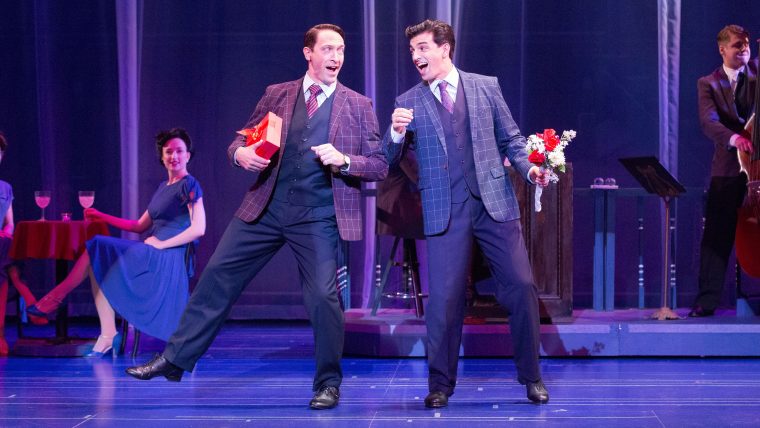
Holiday Inn by Irving Berlin. Walnut Street Theatre in Philadelphia, September 2018.
Holiday Inn has been pleasing audiences since its original movie version in 1942. It was adapted for the stage in 2014 at Goodspeed in Connecticut and came to Broadway in 2016.
This new production at the Walnut Street Theatre actually improves on its staged predecessors in certain aspects. The standouts are Ben Dibble as the romantic lead and Mary Martello as a comical fixer-upper who was not in the movie. The staging and choreography by Charles Abbott and Michelle Gaudette are top notch.
Irving Berlin created the story of a man who retires from a performing career to buy an inn which presents shows only on holidays. It introduced Berlin songs that celebrated Christmas, New Year’s, Lincoln’s Birthday, Washington’s Birthday, Valentine’s Day, Easter, the Fourth of July and Thanksgiving. The name of the Holiday Inn motel chain was inspired by the film.
Berlin’s secondary purpose was to create a vehicle for Bing Crosby and Fred Astaire as song-and-dance partners who are rivals in romances. Ben Dibble assumes the Crosby role and gives it more charm than at Goodspeed and on Broadway. His voice has warmth and he’s romantically believable. Jacob Tischler’s character is the piece’s bad boy. Because he’s an aggressive womanizer, it’s okay that he doesn’t exhibit as much audience appeal. Tischler, however, is a spectacular hoofer in a Fourth of July firecracker tap dance.
Dibble, playing the man who is a singer rather than a dancer, adds unexpected dexterity in a wonderful rope-skipping routine during “Shaking the Blues Away.” It’s a feel-good crowd pleaser.
Cary Michele Miller plays the former owner of the Connecticut property, an independent woman who is courted by both of the leading men. Martello provides many laughs as the inn’s handywoman and is given some musical moments beyond what was heard on Broadway, which she delivers expertly. Fran Prisco is good as a pugnacious agent, and Bonnie Kelly is fine as the ditzy first partner of the song-and-dance team.
The adapters, Gordon Greenberg and Chad Hodge, expanded the surrounding plot, and added songs from the Berlin trunk. “Let’s Take an Old-Fashioned Walk” from the 1949 Berlin show Miss Liberty provides a nice love duet. “It’s a Lovely Day Today” is borrowed from Berlin’s 1951 Call Me Madam. “Heat Wave” (introduced in his 1933 musical As Thousands Cheer) relates to the summertime. “Blue Skies” (written by Berlin in 1926) demonstrates the optimism of Dibble’s character. “Marching Along With Time” seems to fit the plot; it’s a song that Berlin dropped from the movie Alexander’s Ragtime Band.
When Holiday Inn made its stage debut, the score also included Berlin’s haunting lament “What’ll I Do?” and a little-known Berlin creation, “Love Leads to Marriage / that leads to divorce / that leads to lawyers / Expensive, of course,” which was an uncharacteristic curiosity. Both of these were cut in the transfer to Broadway. I regret that some holidays now are omitted, and some of the big hits are trimmed in length. Among the twenty songs, more relate to the love-triangle plot than to Berlin’s intended theme.
The surviving tunes from the movie include the wonderful “White Christmas,”“Let’s Start the New Year Right,””Easter Parade,”“Be Careful, It’s My Heart” for Valentine’s Day, and “Song of Freedom” for the Fourth of July. Fearful that 21st-century audience don’t like long shows, the adapters did not allow Dibble to sing either “White Christmas” or “Be Careful, It’s My Heart” all the way through as solos, as Crosby did (and allowing audiences to bask in their beauty.) Miller joined halfway through each of them to turn them into duets. It was nice to hear her, but this should only happen after we’ve enjoyed the entire songs by the male star, in this case Dibble.
On the whole, the movie was strong on sentimentality while the Broadway production put more emphasis on gags; this Walnut production creates a better balance. Nevertheless, the added story deflects some attention from the historic revue of holiday songs. John Daniels leads a band that sounded too thin.
For the detailed background of this show, click here.
Watch this video excerpt by Lafayette Hills Studios: